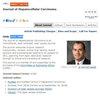CD276 Promotes an Inhibitory Tumor Microenvironment in Hepatocellular Carcinoma and is Associated with Poor Prognosis
IF 4.2
3区 医学
Q2 ONCOLOGY
引用次数: 0
Abstract
Background: CD276 is an emerging immune checkpoint molecule that has been implicated in various cancers. However, its specific role in hepatocellular carcinoma (HCC) remains unclear. This study examined the impact of CD276 on patient prognosis and the tumor microenvironment (TME).Methods: The Cancer Genome Atlas (TCGA) database was utilized to evaluate CD276 expression in HCC and the association between CD276 and immune indicators was also analyzed. The signaling pathways correlated with CD276 expression were identified by gene set enrichment analysis (GSEA). Different algorithms were used to assess immune cell infiltration. The effect of CD276 knockdown on HCC cell phenotypes and its relationship with macrophage polarization was examined using the cell counting kit 8 (CCK-8) assay and co-culture system.
Results: CD276 was upregulated in HCC and associated with unfavorable clinical outcomes. Hgh CD276 expression was associated with enrichment of the G2/M checkpoint, E2F targets, and mitotic spindles. CD276 expression was correlated with the infiltration of immune cells, including high level of tumor-associated macrophages and low levels of CD8+ T cells. Knockdown of CD276 decreased HCC cell proliferation and increased apoptosis. CD276 silencing in HCC cells and co-culture with THP-1–derived macrophages had a regulatory effect on macrophage polarization and macrophage-mediated cell proliferation and migration.
Conclusion: CD276 expression in HCC is associated with unfavorable clinical outcomes and may contribute to the development of an immunosuppressive microenvironment. Specifically, CD276 was associated with alterations in immune cell infiltration, immune marker expression, and macrophage polarization during HCC progression, suggesting its potential as a prognostic indicator and promising target for immunotherapeutic intervention in HCC.
CD276 促进肝细胞癌的抑制性肿瘤微环境并与预后不良有关
背景:CD276 是一种新兴的免疫检查点分子,与多种癌症有关联。然而,它在肝细胞癌(HCC)中的具体作用仍不清楚。本研究探讨了 CD276 对患者预后和肿瘤微环境(TME)的影响:方法:利用癌症基因组图谱(TCGA)数据库评估CD276在HCC中的表达,并分析CD276与免疫指标之间的关联。通过基因组富集分析(GSEA)确定了与CD276表达相关的信号通路。采用不同的算法评估免疫细胞浸润。使用细胞计数试剂盒8(CCK-8)测定法和共培养系统检测了CD276敲除对HCC细胞表型的影响及其与巨噬细胞极化的关系:结果:CD276在HCC中上调,并与不利的临床结果相关。高CD276表达与G2/M检查点、E2F靶点和有丝分裂轴的富集有关。CD276 的表达与免疫细胞的浸润相关,包括高水平的肿瘤相关巨噬细胞和低水平的 CD8+ T 细胞。敲除 CD276 可减少 HCC 细胞增殖,增加细胞凋亡。在HCC细胞中沉默CD276并与THP-1衍生巨噬细胞共培养,对巨噬细胞极化和巨噬细胞介导的细胞增殖和迁移有调节作用:结论:CD276在HCC中的表达与不利的临床预后有关,并可能导致免疫抑制微环境的形成。具体而言,CD276与HCC进展过程中免疫细胞浸润、免疫标志物表达和巨噬细胞极化的改变有关,这表明CD276有可能成为HCC的预后指标和免疫治疗干预的靶点。
本文章由计算机程序翻译,如有差异,请以英文原文为准。
求助全文
约1分钟内获得全文
求助全文

 求助内容:
求助内容: 应助结果提醒方式:
应助结果提醒方式:


